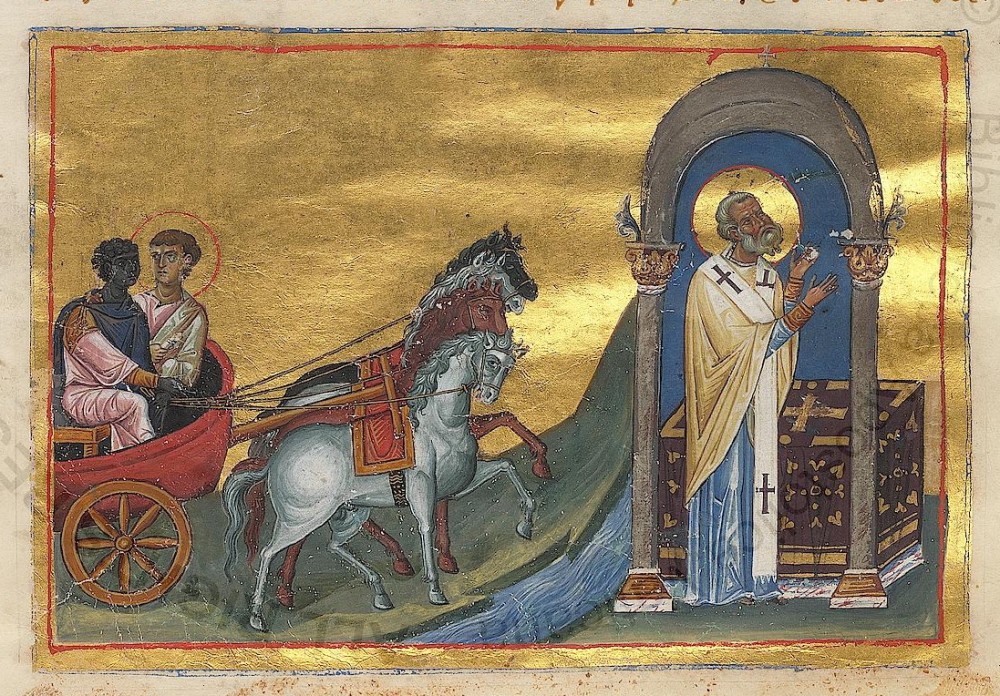Easter 5B (Acts 8:26-40)
I used to read this as a story of Philip’s boldness and willingness to go even to the stranger to declare the truth. Now I understand just how little Philip knows.

Our oldest son was baptized when he was six. For two years before that he’d been asking questions about who God was and praying prayers of his own making. So his mother and I set him upon the road of discipleship. He was old enough to remember the immersion into that watery miracle, but young enough to accept our reminders that it was God’s work, not his (or ours—at least this was what I imagined). My vision for his life included long walks with his parents, times when he would ask us questions about who God was and about what his life’s calling might be. I imagined pondering curious questions about scripture together. Eventually, I might offer him an answer, for he was a precocious child with lots of questions, and I loved being someone with answers. I thought this was part of my calling as a father.
My son is 13 now and thankfully he still asks questions. But they are not the questions that I had imagined. “Dad,” he’ll say, “why are people so dumb?” (he uses another word) or, while reading scripture together, “Why does God tell some of the Israelites to stay away from the top of the mountain? Seems kind of petty.” There are so many questions lurking beneath the surface of his words! Yet I can see that many of the questions of his soul remain unuttered, and on many occasions I do not push him further because I know I don’t have the answers.
Read our latest issue or browse back issues.
When I read the story in Acts about the eunuch and Philip, I am reminded of my years as a young father. Ten years ago I would have read this story as a story of Philip’s boldness and willingness to go even to the stranger to declare the truth of God’s presence in the world. But reading it as a parent I understand just how little Philip knows. It is God who tells him to go, sending Philip along on a strange road where he came upon an Ethiopian eunuch reading a book. “Do you understand what you are reading?” Philip asked, and the eunuch replied, “How can I, unless someone guides me?”
When Philip told the eunuch about Jesus, the Lamb that was slaughtered and the one who did not open his mouth, he was giving not an answer but a testimony. His “answer” was not a matter of conveying knowledge; it was a witness to an encounter, which helped the eunuch to make sense of what was already present to him. Philip did not present the eunuch with the promises of Israel; the eunuch was reading these promises. Instead, Philip found himself confronted with a man who had been confronted by God but needed help discerning the One who was calling him. Philip was only this man’s guide. Is it possible that the point of this story is not Philip’s answer but the eunuch’s journey? Not Philip’s faithfulness, but God’s presence?
Having heard the testimony of Philip concerning the promises of the Lamb, the eunuch better understood what is already in his mind and spirit. Seeing a body of water, he said, “What is to prevent me from being baptized?” and the men went down to the water where Philip baptized the eunuch. In Philip’s testimony the eunuch saw the possibility of his life, his circumstances and the material realities of that particular place. No longer was a body of water a simple source of refreshment; it was now a womb, a space of new life.
The eunuch, a traveler used to knowing the terrain around him and moving assuredly from one place to the next, met Philip and suddenly found himself called into a wilderness and traveling an unfamiliar road. And yet the eunuch’s response was simple. “What is to prevent me?”
Between Philip’s being sent and the eunuch’s earnest confession we find ourselves caught with a discomfiting possibility: the truth of God’s presence is not simply a matter of Philip’s testimony nor of the eunuch’s question. It’s the reciprocity of the encounter that bears witness to the in-breaking of God. Just as a vine’s life is measured not in its length but in its fruit, just as a confession’s power lies not in its words but in its having been heard, so too God’s presence in this moment becomes known in the lives of two strangers who ventured into the wilderness of asking a question, planting a seed and discovering that God would surely cause it to grow. “The eunuch,” we read, “went on his way rejoicing,” while Philip “proclaimed the good news to all the towns until he came to Caesarea.”
Philip’s sending was precipitated not by knowing but by a question. He was sent to discover the question to his answer. In the encounter God became known not in knowledge that flowed from one to the other, but in the interrelationship of questions and testimony. The branches of the vine stretched, bearing new fruit. Then, just as suddenly, the fruit was clipped and sent tumbling down the road to a new field, its seeds of life spilling out along the way.
As much as I would love to give my son the answers he so earnestly seeks, the answer is most often not in the beauty of my words or the depth of my knowledge but in the testimony of my presence, the miracle of his life and the wonder that I sometimes find an answer to his questions. By some miracle, my son and I will have the scales fall from our eyes enough to discover the wonderful possibilities in our midst.






